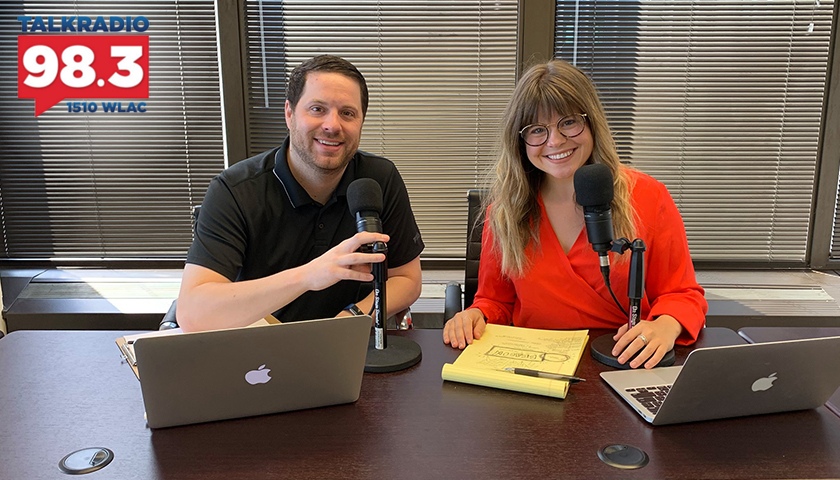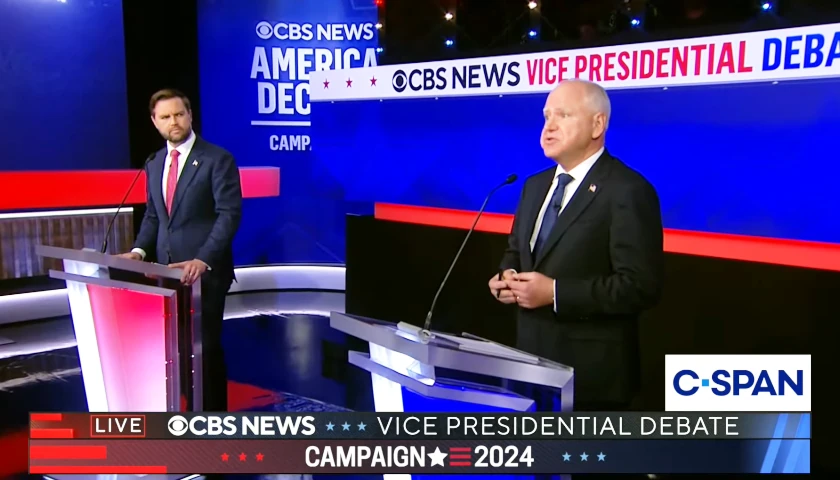Live from Music Row Tuesday morning on The Tennessee Star Report with Michael Patrick Leahy – broadcast on Nashville’s Talk Radio 98.3 and 1510 WLAC weekdays from 5:00 a.m. to 8:00 a.m. – host Leahy welcomed the Beacon Center’s Vice President of Communications Mark Cunningham on the newsmaker line to talk about the Center’s listening tours, which begin tonight in Chattanooga.
Leahy: We welcome to our newsmaker line our good friend Mark Cunningham, Vice President of Strategy and Communications at the Beacon Center, a free-market think tank and action group here in Tennessee. Good morning, Mark.
Cunningham: Hey, Michael, thanks for having me. I appreciate it.
Leahy: Just a little side note, I know you are a graduate of Marquette University in Milwaukee, Wisconsin. Our good friend John Solomon, the CEO and editor in chief of Just the News, is also a Marquette grad. Did the two of you hang out together at Marquette?
Cunningham: I did not know that. I think I might be a little bit younger. I’m not sure, but go Golden Eagles!
Leahy: Go Golden Eagles. I remember them when they were the politically incorrect Warriors. The Warriors.
Cunnigham: Yes. A lot of people on campus still have the Warrior shirts on to kind of fight that PC culture.
Leahy: You bet. Our official guest host, Grant Henry, is in-studio here with me. And we are both curious to find out the answer to this mystery, because the topic you want to talk about is the listening tours. What are the listening tours and what are you going to be doing with those?
Cunningham: So we’re doing something really cool this year that, I think different than any kind of policy organization ever, is that we are actually going out, and I’m actually in Chattanooga right now, we’re going to be talking to small business owners tonight.
But going and doing listening tours across the state and hearing what issues actually matter to them. Not saying “we believe in this issue so we’re going to tell you why you should believe in this.”
But hearing kind of unfiltered, what the biggest issues they’re dealing with. Politicians who are on listening tours don’t listen. All they do is they want to talk about their agenda.
Our whole point here is our agenda next year for the legislation is going to be based on what we hear at these sessions about what’s actually affecting everyday Tennesseans.
Leahy: There are listening tours and then there are listening tours. So Governor Lee and Commissioner of Education Penny Schwinn held ‘listening tours’ in preparation for their education program.
Really, they were basically opportunities for teachers to ask for more money. They did like, I don’t know, eight or 10 of them around the state. Is your listening tour going to be different? Are you really going to listen?
Cunningham: I’ll tell you what, we have a blank agenda for what we’re doing next year. We have decided to change the way we do all of our policy, because a lot of our policy might be good policy, but it doesn’t affect a ton of Tennesseans.
Now, of course, everything we will do, what policy we would take up, would be a free-market perspective. But we have already been hearing the cost of housing is too high, homelessness, and trying to think creatively outside of the box and saying we’re free-market kind of solutions to help ease this problem.
So I promise this is not like any politician’s listening tour. We have an absolute blank slate, and we are going to hear what people have to say and then make our decision on policies after the fact, not beforehand trying to convince people of them.
Henry: Hey Mark, this is Grant Henry here. Beacon Center has always been fairly specific with the issues that it takes on, focusing on the world of entrepreneurship, innovation, educational opportunity, worker freedom, property rights, things like this. Where did this idea, in particular, come from to go directly to the people?
Cunningham: If you want to be honest, it came from me. I think some of the things that we do are a little bit too high-level. They’re very specific, like you said.
And some of them, as much as, you know, people might say that’s great policy, but it doesn’t really affect my everyday life. So I think that we’ve had to kind of look back and say, are we really working for the people that we say we’re working for?
And I think in some of these answers, the answer is not always yes. So while we work on good policy, it’s going to be important that we actually do policy that affects people’s lives because we hear every day, why don’t you work on this?
Why don’t you work on this? Well, here’s our chance. We’re going to be polling 1,200 people across the state once we do these in-person listening tours to see what issues matter the most to the state.
We’re going to do it exactly the way it is with Republican Democrats, kind of a very good mixture based on what the state looks like politically.
Leahy: So is tonight in Chattanooga, the very first of the listening tours?
Cunningham: It’s our first in-person session. We’ve done a few online. We have a kind of professional pollster helping us. So we did one in Middle Tennessee so far, and the results are probably what you expect. But this is going to be our first one that we’re kind of going out and talking to people in person.
Leahy: Tell us where the venue is tonight and what’s the structure of the evening?
Cunningham: Unfortunately I have to keep the venue quiet because we don’t want people coming in and trying to fight the Beacon Center and say, oh, we hate you, you hate teachers, all that other garbage that you hear from them.
So we are keeping that quiet. I can tell you offline. But the structure is, basically I’m going to be running this and we’re going to ask these small businesses their top-three biggest issues and then talk through and say, okay, as a small business, what are the biggest issues you’re facing right now?
They’re going to write it down kind of very broadly on a piece of paper, and then we’re going to talk to eight to 12 business centers in the Chattanooga area and kind of delve deeper into why these issues exist, what they think the solutions are, and kind of what the cause of the problem is in their mind.
And then kind of talk through and see what issues they have in common and try to get some key takeaways that most of the people agree with.
Leahy: So, you’ve got about a dozen small business owners in the Chattanooga area that will be meeting with you at a secret location tonight, right?
Cunningham: Correct. Undisclosed location. We don’t want the teachers’ union to come to crash it.
Leahy: At an undisclosed location. I suppose you have security there to keep the teachers’ unions and other unions out of it. Because who knows what they might do.
Cunningham: Yeah, we at least talked to the management. We have not told anybody about location. And most of these people are not people recruited by us either.
We tried to get a pollster to come in and put people that met these criteria so that we don’t have any kind of predisposition of saying, oh, I know these people, like, because they’re supporters or something. So these are all people that we don’t know.
Leahy: How long is this event going to take place tonight?
Cunnigham: It’s about an hour and a half tonight.
Leahy: Hour and a half.
Cunningham: I can maybe show you some afterwards, too.
Leahy: Sure. How many of these will you be doing around the state and how long will you be doing this?
Cunningham: I think we have about six planned right now, and that’s going to be over the next three months or so. And then we’re going to have that big 1,200-person poll as I talked about in the state, which will be based on the results we get and the feedback we get from that to see, now that we have these great tidbits and nuggets from people we talk to, let’s ask the entire state if these are the issues that matter to them as well.
Henry: Mark, let me ask you here. I imagine that sometimes you may run across a situation where some of the people you’re asking questions of are giving you issues that are really federal issues and not necessarily designed or directed with what the state legislature can handle.
Let me ask kind of a two-part question here, then. One, what do you do to handle those to redirect them back to state concerns? And two, what kinds of concerns are you hearing so far?
Cunningham: Yes, that’s absolutely true. You get a lot of people saying, oh, well, I have an issue with this or immigration or things like that. Listen, that’s not something we can handle or something we can do in the state.
But it’s also important for us to think, is there a way for us to handle that even if it is a federal issue. Are there things that we can do in the state no matter what it is? I think that we have to kind of think a little bit deeper, too.
So we try to kind of let them talk and then try to see if we can kind of move on to another subject that’s more state-related. And at that point, you can say, okay are there other issues that matter to you in a state as well?
Listen to the full interview:
– – –
Tune in weekdays from 5:00 – 8:00 a.m. to the Tennessee Star Report with Michael Patrick Leahy on Talk Radio 98.3 FM WLAC 1510. Listen online at iHeart Radio.
Photo “Beacon Center of Tennessee” by Beacon Center of Tennessee.





